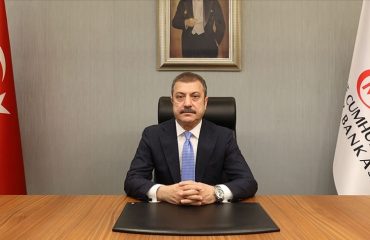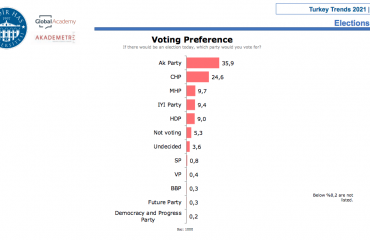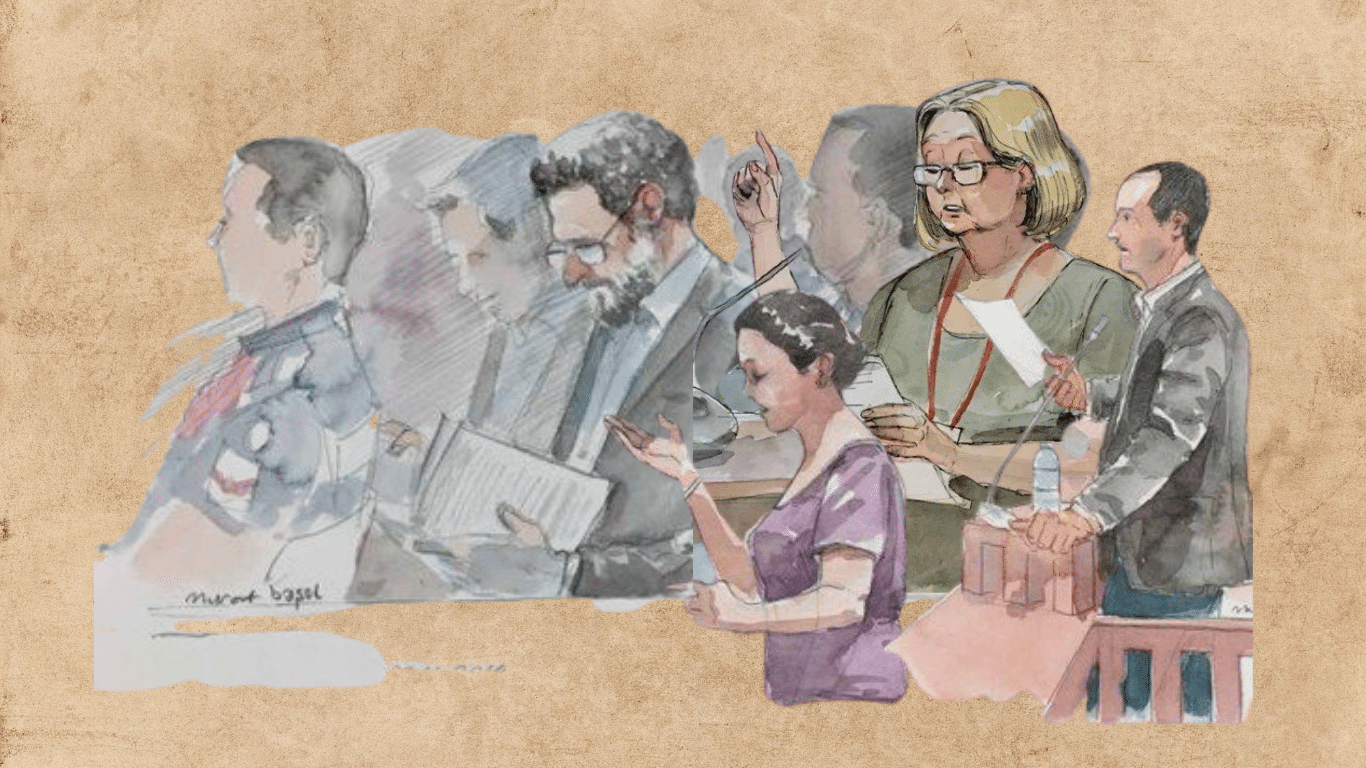
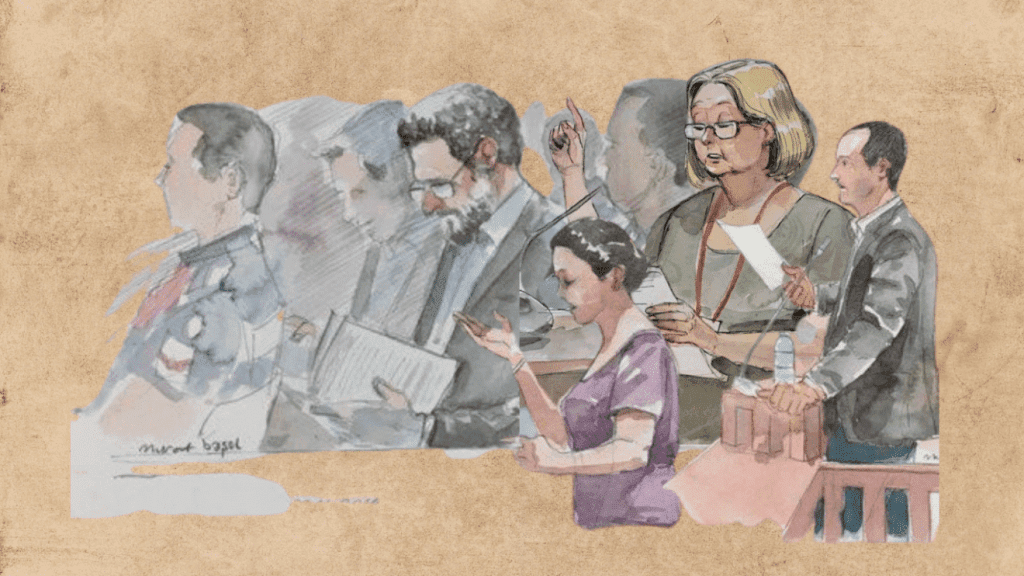
The Istanbul Chief Public Prosecutor İrfan Fidan, who led the retrial of the Gezi Park Case in which Osman Kavala was sentenced to life imprisonment and 7 people to 18 years in prison, is now the Constitutional Court Judge who has started to hear the appeal process. (Drawings: Murat Başol, collage: YetkinReport)
Marking the sixth month since the human rights defenders were sentenced to 18 years in prison for the case brought against the 2013 Gezi Park protests, we face another judicial scandal.
Let me remind you first that the case against the Gezi Protests, which was a nationwide civil protest that happened in May-June 2013, was filed in 2016, and all the defendants were acquitted in the first trial process. One of the defendants was philanthropist Osman Kavala, who was detained in prison in 2016 and kept in prison waiting for trial for 3 years without indictment. The case was reopened with minor changes in the indictment after the Constitutional Court ordered Kavala to be released.
Prosecutor İrfan Fidan, keep that name in mind, who conducted the investigations with the sweeping authorities granted after July 15 2016 coup attempt has been attained as the İstanbul Chief Public Prosecutor as the case reopened.
As the legal process progressed, President Tayyip Erdoğan appointed İrfan Fidan to the Supreme Court, the appeal authority in such cases, in November 2020.
Prosecutor becomes the judge
The defendants kept exhausting all domestic remedies by applying to the Constitutional Court, as the European Court of Human Rights ruled several times that Kavala’s imprisonment was a violation of his rights.
This time in January 2021, İrfan Fidan became a member of the 15-member Constitutional Court, with Erdoğan’s appointment capacity. Four members of the court are appointed by the president, as the 2018 constitutional change stipulates. The three members of the court are elected by the parliament, where the ruling AKP, led by Erdoğan, holds the majority. The decisions are taken with a majority of votes.
Istanbul 13th Heavy Penal Court sentenced Osman Kavala to aggravated life imprisonment in the Gezi Trial on April 25, 2022. Human rights defenders, lawyers, city planners, and producers including Mücella Yapıcı, Çiğdem Mater, Hakan Altınay, Can Atalay, Mine Özerden, Yiğit Ali Ekmekçi, Tayfun Kahraman were sentenced to prison 18 years each.
Yapıcı, Atalay and Kahraman appealed to the Constitutional Court on the grounds of freedom of expression and unlawful detention. The appeal was dismissed on 18 August. One of the Constitutional Court members who signed the rejection letter was Selahaddin Menteş and the other was İrfan Fidan. The prosecutor in the case is now the top judge, who will look at his own decisions to see if they are in line with the constitution.
The search for justice in the Gezi Trial in Parliament
Selahaddin Menteş was appointed to the Constitutional Court by President Erdoğan in 2019 while he was Deputy Minister of Justice. His previous duties were as the Undersecretariat of the Ministry of Justice and the Head of the State of Emergency Procedures Investigation Commission. He was a member of the AKP’s judicial bureaucracy.
Another member also joined this 15-member top court which will assess possible appeals of the Gezi Case: Muhterem İnce, who was one of the former Deputy Ministers of Interior Affairs. These judges will also decide on the Kurdish-issue-focused HDP’s closure case.
The “If you can’t change the justice, change the judge” rule works here.
On October 25, I met Mustafa Atalay, the father of Lawyer Can Atalay who was one of the defendants sentenced to 18 years in the Gezi Trial. Atalay’s family and lawyers were backstage at the Turkish Grand National Assembly. They came to attend HDP and then the main opposition CHP group meetings. They received applause and support from both groups.
“We are searching for justice. Have you seen it? ” He joked bitterly.
I replied by myself, “Tell me if you see it.”
The next day, CHP Eskişehir Deputy Utku Çakırözer brought the situation of another victim of the Gezi Case, Hakan Altınay, to the attention of the parliament. He based his speech at the parliament lectern on Altınay’s previous letter to Parliament’s Foreign Affairs committee.
“Is Altınay wrong?”
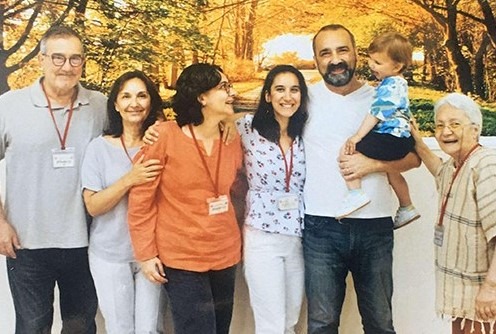
Altınay with her child and family in her arms during public viewing in Silivri (Marmara) Prison.
In his speech in which he discussed Altınay’s case specifically, Çakırözer said:
“Hakan Altınay did not take a gun and kill a man. Let alone the gun, he did not throw a stone. His trial is still ongoing, his case is on appeal. After that there is the Supreme Court procedure, so his conviction is not finalised yet. And yet, he has been in prison for six months.
“Not only him, Mücella Yapıcı, Mine Özerdem, Çiğdem Utku, Can Atalay and Tayfun Kahraman; All innocent, they have been held in prison for six months. Again, another innocent person, Osman Kavala, has been kept in prison, deprived of his freedom for exactly one thousand eight hundred and twenty-two days, exactly five years.
“Who’s holding? Judiciary in appearance, but never independent, never impartial. By the order of the presidential palace, by the political order, these people have been cut off from their lives, families and loved ones.
“Well, you may say, why did Hakan Altınay send us a letter? He also wrote that in his letter. He says, “The results of these trials, which are full of inconsistencies and mistakes, negatively affect Turkey as a whole. The world’s public opinion has developed some irreparable judgments regarding the priorities of the Turkish judiciary. It is the duty of the Assembly and you, the deputies, to ensure that this judiciary does not become more entrenched.’ I ask: Is Mr. Hakan Altınay right, dear deputies?”
